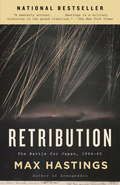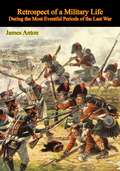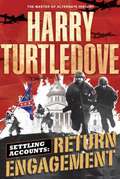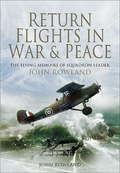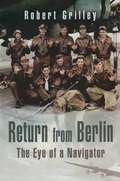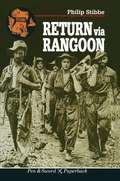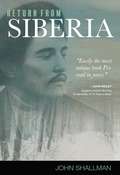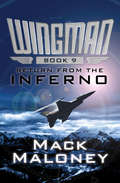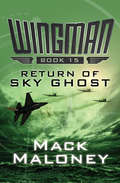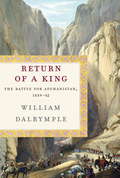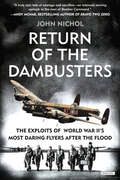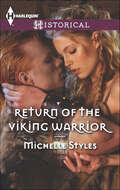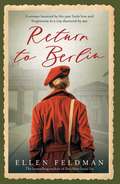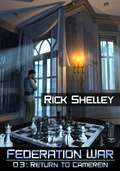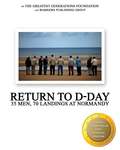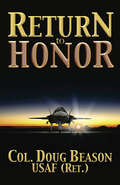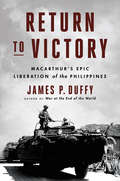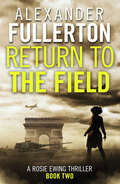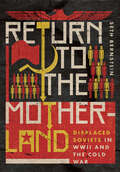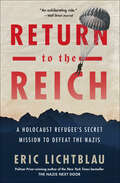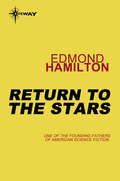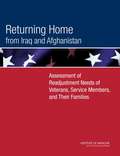- Table View
- List View
Retribution: The Battle for Japan, 1944-45
by Max HastingsHaving written Armageddon about the closing year of the Second World War in Europe, veteran British journalist Hastings here turns his attention east for a similar project about the Pacific theater. His integrated military history of the final year of war before Japan's surrender attempts to treat all the campaigns of the Eastern theater of a piece, including such neglected aspects as the Chinese experience and the Russian assault on Manchuria, with the exception of indigenous anti-colonial resistance movements, which were too large a topic to include. Annotation ©2008 Book News, Inc. , Portland, OR (booknews. com)
Retrospect of a Military Life, During the Most Eventful Periods of the Last War
by Sgt. James AntonOriginally published in 1841, this memoir by Qtr.-Mr.-Gen. Sgt. James Anton of the 42nd or Royal Highlanders is widely regarded as a leading source for the Peninsular and Waterloo period."Since so many military memoirs have issued from the press during the last twenty-five years, it may be thought a rather presumptive undertaking on the part of a Soldier to usher another work of this kind into public notice. Yet amidst all the failures we daily witness in the book-making world, we still see fresh adventurers succeed to fill up the chasm occasioned by the unsuccessful speculations of their predecessors; and, although friendly hints may be given that this or that pursuit is overdone, the adventurers still pursue their course, and the usual results follow. Misfortune overwhelms the many, fortune favours the few, and the latter gives a stimulus to fresh adventure, while the former seldom serves as a warning to guard against the risk. [...]"Stimulated more by a desire to merit the esteem of my friends, and the good opinion of all who wish to maintain strict discipline in the army, than to reap any substantial reward for the labour of my pen, I come forward to offer this my mite for the use of those who may be pleased to cater for the public information, and lay before them some incidents which may have escaped the observation of more distinguished writers...."
Return Engagement: Settling Accounts, Book One (Settling Accounts #1)
by Harry TurtledoveHarry Turtledove’s remarkable alternative history novels brilliantly remind us of how fragile the thread of time can be, and offer us a world of “what if.” Drawing on a magnificent cast of characters that includes soldiers, generals, lovers, spies, and demagogues, Turtledove returns to an epic tale that only he could tell–the story of a North American continent, separated into two bitterly opposed nations, that stands on the verge of exploding once again. In 1914 they called it The Great War, and few could imagine anything worse. For nearly three decades a peace forged in blood and fatigue has held sway in North America. Now, Japan dominates the Pacific, the Russian Tsar rules Alaska, and England, under Winston Churchill, chafes for a return to its former glory. But behind the façade of world order, America is a bomb waiting to go off. Jake Featherston, the megalomaniacal leader of the Confederate States of America, is just the man to light the fuse. In the White House in Philadelphia, Socialist President Al Smith is a living symbol of hope for a nation that has been through the fires of war and the flood tides of depression. In the South, Featherston and his ruling Freedom Party have put down a Negro rebellion with a bloody fist and have interned them in concentration camps. Now they are determined to crush their Northern neighbor at any cost. Featherston’s planes attack Philadelphia without warning. The U.S.A. lashes back blindly at Charleston. And a terrible second coming is at hand. When the CSA blitzkrieg is launched, the U.S.A. is caught flat-footed. Before long, the gray Army reaches Lake Erie. But in its wake the war machine is spinning a vortex of destruction, betrayal, and fury that no one, not even Jake Featherston himself, can control. Now, President Smith faces a Herculean task, while an obscure assistant secretary of war named Roosevelt rises in his ranks. For the U.S.A., the darkest days still lay ahead. Across the globe, a new era of war has just begun. And in the hands of the incomparable Harry Turtledove, readers are treated to a masterful vision of what might have been. An enduring portrait of history, nations, and human nature in its many manifestations, Return Engagement is a monumental journey into the second half of the twentieth century.
Return Flights in War & Peace: The Flying Memoirs of Squadron Leader John Rowland
by John RowlandJohn Rowland made his first flight with the RAF Volunteer Reserve on 1 October 1938 from Redhill in a DH60 Moth. He won a Prize Cadetship to the RAF College Cranwell and then posted to the School of Army Cooperation. He volunteered for 613 Squadron which had been formed shortly before the war started. It was still not fully equipped with Lysanders and half of its planes were still elderly Hectors. On 25 May 1940 came the news that six Hectors were to be sent off on a ground strafing operation to relieve the pressure on the garrison of Calais which was blocking the Germans from advancing up the coast towards Dunkirk and encircled by German troops Three Hectors flew on each side of Calais and created as much of a diversion as they could by dropping bombs and firing their guns at anything they could see. This was the only occasions on which such obsolete aircraft was used in Europe in WW2.He converted to heavy bombers and was posted to 12 Squadron at Wickenby flying Halifaxs in June 1943. On 3 July he made his first trip to Cologne, Germany. After he had flown 28 operations he was promoted to Squadron leader as a flight Commander at 1656 HCU at Lindholme. He was next posted to 625 Squadron as a flight Commander on 12 May 1944. It was a two flight Lancaster Squadron. The last of his 48 bomber operations was to Calais, the town to which he made his first operational flight in the Hector in 1940.After the war John flew as an airline pilot with BOAC.
Return From Berlin: The Eye of a Navigator
by Robert GrolleyDuring the summer of 1944, the US Eighth Air Force was engaged in a ferocious daytime bombing campaign over Europe. This book is the memoir of a B–17 navigator who found himself far from his American home, based in the English countryside of Northamptonshire. His war in the air, flying deep into enemy territory, surviving intense enemy anti-aircraft fire and enemy fighter attacks, portrays the sometimes conflicting emotions of a young man at war. The book also relates how thfriendship with their eight year-old daughter, a relationship that becomes a symbol of survival.
Return Via Rangoon
by Philip StibbeThis is one young officer's war story about training and inspiration in the Burmese jungle behind enemy lines. Beaten up and water tortured, yet only giving his captors false information, Stibbe was moved around Burma until he was eventually imprisoned in Rangoon jail. Now stricken with Parkinson's disease, probably as a result of his prison diet, Stibbe with his eldest son, also a soldier, has revised his book and this edition published to coincide with the 50th anniversary of Wingate's second triumphant Chindit expedition.
Return from Siberia
by John ShallmanIn the lead-up to the Bolshevik Revolution, one young revolutionary is condemned to exile in Siberia; a hundred years later, his ancestors discover his story and learn just how much history has repeated itself. In the midst of running a long-shot political campaign, Democratic political consultant John Simon discovers a 100-year-old manuscript written by his grandfather Joseph—a brilliant young revolutionary whose exile to Siberia by the last czar of Russia is just the beginning of an extraordinary tale of survival, romance, and revolution. Return From Siberia chronicles not only the Simon family's relationship to each other and the past, but also the remarkable story of a young man who sacrificed everything for his political ideals. As Joseph's manuscript is translated, chapter-by-chapter, the Simon family is pulled deep into their ancestor&’s story— in particular, the bitter rivalry between two brothers, whose competing visions of the American Dream are played out on the campaign trail and in their lives. Return from Siberia is a timely appraisal of modern politics and society juxtaposed with an inside look into the machinations of a young political mind 100 years ago. The true story documents an extraordinary time of political upheaval in Russia and Europe just prior to World War I while also drawing parallels to current day American politics and the current philosophical and ideological debates about immigration, Democratic Socialism, and Capitalism. Beyond the deep social, political, and philosophical themes, there is romance, adventure, betrayal, suspense, and the struggles of families today and in yesteryear. Return from Siberia illustrates how one modern family's connection to the past helps them resolve their future.
Return from the Inferno: Return From The Inferno, War Of The Sun, The Ghost War, Target: Point Zero (Wingman #9)
by Mack MaloneyWhen the Wingman vanishes, it's up to the remaining few to fight America's latest invaders Just as America is beginning to recover from nuclear war, her enemies attack again. As ace pilot Hawk Hunter battles the horde of Nordic mercenaries who have ravaged the East Coast, another army lands in California: the combined forces of the dictatorships of East Asia. The Second Axis is here. As always, Hunter leads the charge, flying his famous red, white, and blue F-16 into the invasion's maw. But for the first time ever, the Wingman does not come out the other side. Their champion gone, America's soldiers carry on in his absence, resorting to guerilla warfare in a desperate attempt to protect the country's interior. As the hopeless battle wears on, rumors circulate that Hunter is out there somewhere, planning a counterattack. Until that glorious day comes, there is nothing America can do but hope. Return from the Inferno is the ninth book of the Wingman series, which also includes Wingman and The Circle War.
Return of Sky Ghost: Death Orbit, The Sky Ghost, Return Of Sky Ghost, The Tomorrow War (Wingman #15)
by Mack MaloneyA fighter pilot is trapped in an alternate universe—where an attack on Pearl Harbor is about to happen . . . In a parallel universe, the Nazi war machine has finally been defeated after fifty years of combat. But just a few weeks after Victory in Europe Day, war breaks out in a hitherto peaceful theater: the Pacific. A small American ship is on a routine patrol when its captain spies three aircraft-carrying submarines so large that they leave tidal waves in their wakes. Dozens of attack planes stream out from the colossal ships, destroying Pearl Harbor in a matter of minutes before disappearing back into the sea. Ace fighter pilot Hawk Hunter has heard this story before. A refugee from the dimension where World War II ended in 1945, he&’s still getting used to this new universe when the Japanese strike. To defeat them, the United States will need the Wingman—the finest pilot of all time—to rise up in this reality just as he has in the other. Return of the Sky Ghost is the fifteenth book of the Wingman series, which also includes Wingman and The Circle War.
Return of a King: The Battle for Afghanistan, 1839-42
by William DalrympleFrom William Dalrymple--award-winning historian, journalist and travel writer--a masterly retelling of what was perhaps the West's greatest imperial disaster in the East, and an important parable of neocolonial ambition, folly and hubris that has striking relevance to our own time. With access to newly discovered primary sources from archives in Afghanistan, Pakistan, Russia and India--including a series of previously untranslated Afghan epic poems and biographies--the author gives us the most immediate and comprehensive account yet of the spectacular first battle for Afghanistan: the British invasion of the remote kingdom in 1839. Led by lancers in scarlet cloaks and plumed helmets, and facing little resistance, nearly 20,000 British and East India Company troops poured through the mountain passes from India into Afghanistan in order to reestablish Shah Shuja ul-Mulk on the throne, and as their puppet. But after little more than two years, the Afghans rose in answer to the call for jihad and the country exploded into rebellion. This First Anglo-Afghan War ended with an entire army of what was then the most powerful military nation in the world ambushed and destroyed in snowbound mountain passes by simply equipped Afghan tribesmen. Only one British man made it through. But Dalrymple takes us beyond the bare outline of this infamous battle, and with penetrating, balanced insight illuminates the uncanny similarities between the West's first disastrous entanglement with Afghanistan and the situation today. He delineates the straightforward facts: Shah Shuja and President Hamid Karzai share the same tribal heritage; the Shah's principal opponents were the Ghilzai tribe, who today make up the bulk of the Taliban's foot soldiers; the same cities garrisoned by the British are today garrisoned by foreign troops, attacked from the same rings of hills and high passes from which the British faced attack. Dalryrmple also makes clear the byzantine complexity of Afghanistan's age-old tribal rivalries, the stranglehold they have on the politics of the nation and the ways in which they ensnared both the British in the nineteenth century and NATO forces in the twenty-first. Informed by the author's decades-long firsthand knowledge of Afghanistan, and superbly shaped by his hallmark gifts as a narrative historian and his singular eye for the evocation of place and culture, The Return of a King is both the definitive analysis of the First Anglo-Afghan War and a work of stunning topicality.From the Hardcover edition.
Return of the Dambusters: The Exploits of World War II's Most Daring Flyers After the Flood
by John NicholA history of the RAF&’s 617 Squadron during World War II, from bombing Nazi battleships to attempts on the lives of Hitler & Mussolini, and more. The Dambusters had another nickname—they were the &“Suicide Squadron,&” and these daring flyers were the go-to forces for dangerous precision attacks. They dropped the largest bombs ever built on Hitler&’s prize battleship, Tirpitz, as well as rocket sites and secret weapon establishments; they were involved in attempts on the lives of enemy leaders, including Hitler and Mussolini; and they created a false fleet on D-Day, which fooled the Germans, among other crucial missions. but they also suffered brutal losses, with seventy-five percent of 617 Squadron killed in action by the end of the war. In this awe-inspiring book, John Nichol—himself a former RAF flight lieutenant—retraces the path of 617 Squadron&’s most dangerous sorties, the ones largely lost to history. With the sensitivity of a fellow soldier, Nichol gains unprecedented access to the surviving Dambusters, whose moving personal stories add depth to this impressively researched history. The result is a tense, poignant story of courage by men who braved death time and time again in the name of freedom.Praise for Return of the Dambusters &“A truly epic tale of courage and sacrifice—an intensely moving epitaph to the men of Bomber Command.&” —Andy McNab, bestselling author of Bravo Two Zero &“A straightforward account considers all sides to these precise missions.&” —Kirkus Reviews &“This is both an exciting book and a saddening one . . . a tale of victory, in the end, magnificently told in lip-biting detail.&” —The Daily Mail (UK) &“Drawing on interviews with survivors, as well as archive material . . . the book is [a] story of human suffering in the air and on the ground.&” —The Times (UK)
Return of the Viking Warrior
by Michelle StylesTHE VIKING CLAIMS HIS WIFE Kara Olofdottar thanked the gods when she married her childhood hero Ash Hringson. But this fearless raider has been gone so long, his proud arrogance is the only memory she retains of him. Now she must remarry to protect her lands for her son. But then, on her wedding day, the conquering warrior returns to gasps of horror and surprise! After all, Ash was supposed to be dead, though to Kara's starved gaze he seems very much flesh and blood...and less than impressed to find his beautiful wife intent on marrying someone else!
Return to Berlin
by Ellen FeldmanFor fans of The Light After the War, a young woman haunted by a heartbreaking secret finds hope and forgiveness in a city shattered by war. Young Meike Mosbach and her brother escape Berlin just before the horror of Kristallnacht, leaving their parents and little sister to follow them to America. But their family never arrives. Haunted by their loss, Meike becomes Millie and graduates from college to work as a magazine journalist while David enlists in the army to work in intelligence. After the war, they both return to a shattered Berlin, hoping against hope to find their family. Postwar Berlin is a wild west where drunken soldiers brawl, spies ply their trade and &‘werewolves&’ – unrepentant Nazis – scheme to rise again. Consumed with rage at her former country, Millie&’s job for the army rooting out Nazis from regaining a voice seems the perfect outlet. But her anger begins to thaw as she is faced with the daily reality of what the war has done to everyone, and the enigmatic Major Harry Sutton, who seems too eager to be fair to the Germans and far too perceptive about Millie. In the rubble of postwar Berlin, Millie must come to terms with a devastating secret and find the courage to embrace love – and a new beginning.Praise for Return to Berlin &‘A gorgeous, shattering novel that could not be more timely about the dark damage of hatred and the persistence of love.&’ Caroline Leavitt, NYT bestselling author of Is This Tomorrow &‘A beautiful, atmospheric novel that transports us to Occupied Berlin, a perfect setting in which to examine the contours of shame, as well as the possibilities of forgiveness.' Elizabeth J. Church, author of The Atomic Weight of Love and All the Beautiful Girls &‘Ellen Feldman masters the two great challenges of the historical novel, mapping the human heart as expertly as she does another time and place. Her story sears, uplifts and compels. A terrific read, brilliantly written.&’ Kevin Baker, author of Dreamland and Paradise Alley &‘Postwar Berlin springs vividly to life in this engrossing, emotionally powerful novel … Beautifully written, rich with detail and a brilliantly drawn cast of characters, from a writer with an unrivaled grasp of history and the human heart.' Liza Gyllenhaal, author of Local Knowledge 'A deeply satisfying and truly adult novel.&’ Margot Livesey, author of The Flight of Gemma HardyPraise for Paris Never Leaves You &‘Masterful, magnificent. A passionate story of survival. This story will stay with me for a long time.&’ Heather Morris, author of The Tattooist of Auschwitz
Return to Berlin
by Ellen Feldman&‘Masterful, magnificent. A passionate story of survival. This story will stay with me for a long time&’ Heather Morris, bestselling author of The Tattooist of Auschwitz on A Bookshop in ParisA young German Jewish woman returns to Allied Occupied Berlin from America to face the past and unexpected future.Young Meike &‘Millie&’ Mosbach and her brother David escape Berlin just before the horror of Kristallnacht, leaving their parents and little sister to follow them to America. But their family never arrives. After the war they return to a shattered city, hoping against hope to find their family. Postwar Berlin is a wild west where drunken soldiers brawl, spies ply their trade and &‘werewolves&’ – unrepentant Nazis – scheme to rise again. Consumed with rage at her former country, Millie&’s job rooting out Nazis from publishing seems the perfect outlet. But her anger begins to thaw as she is faced with the reality of what the war has done to everyone, guilty at their own good fortune. Everyone except for Millie&’s boss, Major Harry Sutton, who seems too eager to be fair to the Germans and far too perceptive about Millie. In the rubble of postwar Berlin, Millie is forced to confront a devastating secret and find the courage to embrace love – and a new beginning.Atmospheric and page-turning, Return to Berlin is a story of love, survival, and forgiveness of others and of self.'A deeply satisfying and truly adult novel' Margot Livesey, author of The Flight of Gemma Hardy'A gorgeous, shattering story that could not be more timely about the dark damage of hatred and the persistence of love' Caroline Leavitt, author of Is This Tomorrow
Return to Camerein (Federation War #3)
by Rick ShelleyPrince George, Earl of New Britain, was supposed to hold a position of great importance on Buckingham, capital world of the Second Commonwealth. However, Prince George wasn't on Buckingham. He hadn't been for seven years, in fact. The Federation War had stranded him on the resort world of Camerein, His Royal Highness little more than a footnote to the long, bitter war.Newly made Captain David Spencer has proven his worth time and again on the fields of battle. But his latest promotion comes with some strings attached. He'll have to lead a top secret mission to Camerein, to determine once and for all the fate of Prince George.Camerein is now in play. With a nearby shuttle crash putting Prince George and the other stranded resort guests on the move, Captain Spencer beginning his search, and the Federation looking for one last bargaining chip for the war's endgame, the resort world of Camerein is about to host a deadly game of cat and mouse. The future of the Second Commonwealth could rest on who catches whom.Rick Shelley concludes the Federation War trilogy with another great novel that puts the high tech toys and skilled tactics of David Spencer's Royal Marines team to use on the home front, bringing every sensation of war home to the reader.PRAISE FOR THE AUTHOR:"Rick Shelley was a soldier at heart, and his books were written from the heart. They carry the real feel of the sweat, blood, and camaraderie of those on the front lines." --Jack Campbell, author of the bestselling Lost Fleet series
Return to D-Day: 35 Men, 70 Landings at Normandy
by The Greatest Generations Foundation Warriors Publishing Group<p>A World War II veteran in the twilight of his life stands once again on the soil where he fought the Nazis when he was a young man. He remembers those long-gone days of terror and valor and thinks of friends who died before his eyes. In a voice tinged with age and emotion, he talks about what he saw and heard and felt. Why would he want to revisit the places where he saw hell erupt around him? For many veterans, the experience brings a sense of closure to memories that often have been locked away like an old uniform. They find healing in places where once they witnessed the worst--and the best--that humanity has to offer. <p>Since 2004, The Greatest Generations Foundation has offered the opportunity for veterans to return to their battlefields at no cost to them. These voyages back to the battlefields are often emotional, providing aging veterans a long-overdue method of dealing with their war experiences, a chance to re-kindle pride in their service and sacrifices, and a venue to educate others. <p>In<i> Return to D-Day</i>, you can share in the stories of 35 such men, accompanied by John Riedy's striking photographs that capture the raw emotions of their return to a pivotal battlefield of World War II in Europe. These are tough men who did things in war that often seem impossible today, things that needed doing if the world was to shake free of Nazi tyranny. Standing on Normandy Beaches, once among the bloodiest battlegrounds of military history, they humbly reflect on those events with acute and incisive hindsight. These men changed the course of history.</p>
Return to Honor
by Doug BeasonThe President of the US is seized on Air Force One. An American spy satellite pinpoints the plane in a remote and hostile African country...
Return to Honor
by Doug BeasonFive thousand miles from the U.S., the president of the United States is facing death. In one hour, an American force will strike back—with the most daring rescue mission ever! The RDF—Marine Corps Rapid Deployment Force—can strike anywhere in the world in under an hour. Their secret weapon: the Trans-Atmospheric Vehicle flown at 15,000 miles per hour by the Air Force&’s most elite pilots, carrying a deadly cargo of highly trained marines. The technology is unproven. But its time has come.…
Return to Valetto: A Novel
by Dominic SmithWinner of the Texas Institute of Letters Jesse H. Jones Award for FictionA Best Book of the Year: BookPageA Must-Read: The New York Post and The Christian Science Monitor“A story of love, loss, and the enduring power of hope. I was transfixed from page one.” ―Lara Prescott, New York Times bestselling author of The Secrets We KeptFrom the bestselling author of The Last Painting of Sara de Vos, Dominic Smith’s Return to Valetto tells of a nearly abandoned Italian village, the family that stayed, and long-buried secrets from World War II.On a hilltop in Umbria sits Valetto. Once a thriving village that survived centuries of earthquakes and landslides and became a hub of resistance and refuge during World War II, it has since been nearly abandoned, as residents sought better lives elsewhere. Only ten remain, including the widows Serafino—three eccentric sisters and their steely centenarian mother—who live quietly in their medieval villa. Then their nephew and grandson, Hugh, a historian, returns.But someone else has arrived before him, laying claim to the cottage where Hugh spent his childhood summers. The unwelcome guest is the captivating and no-nonsense Elisa Tomassi, who asserts that the family patriarch, Aldo Serafino, a resistance fighter whom her own family harbored, gave the cottage to them in gratitude. But like so many threads of history, this revelation unravels a secret—a betrayal, a disappearance, and an unspeakable act of violence—that has affected Valetto across generations. Who will answer for the crimes of the past?Dominic Smith’s Return to Valetto is a riveting journey into one family’s dark past, a page-turning excavation of the ruins of history, and a probing look at our commitment to justice in a fragile world. It is also a deeply human and transporting testament to the possibility of love and understanding across gaps of all kinds—even time.
Return to Victory: MacArthur's Epic Liberation of the Philippines
by James P. DuffyGeneral Douglas MacArthur's bloody campaign to defeat die-hard Japanese forces and liberate the Philippines &“I shall return,&” General Douglas MacArthur promised the Filipino people following the Japanese invasion and occupation of the Philippines in spring 1942. The people there believed MacArthur&’s vow—and even Americans were stirred by his dramatic pledge. Now, two and half years later, MacArthur was ready to fulfill his promise--the liberation of the Philippines was about to begin. It would not be an easy campaign. The more than 7,000 islands of the Philippine archipelago were the key to taking down the Japanese Empire—and the Imperial forces were prepared to sacrifice every man and every ship to prevent MacArthur from regaining control of them. Covering both the strategic and tactical aspects of the campaign through the participation of its soldiers, sailors, and airmen, as well as its commanders, James P. Duffy leads readers through a vivid account of the nearly year-long, bloody campaign to defeat over a quarter million die-hard Japanese defenders in the Pacific theater. Return to Victory is a wide-ranging, dramatic and stirring account of MacArthur&’s epic liberation of the Philippines.
Return to the Field (Rosie Ewing Spy Thrillers)
by Alexander FullertonIn this stunning adventure set in war-torn France—a British agent finds herself in Nazi territory—and unsure about who to trust . . . It&’s the spring of 1944 and Rosie Ewing is returning to German-occupied France, by air, this time. She&’s carrying a radio, half a million francs, a pistol, and two cyanide capsules to Finistere in north-west Brittany. With D-Day looming, Rosie fears that the man who&’ll be meeting her on the ground tonight may be a traitor. She can&’t be certain. But she does know that the likely end of the road for captured female agents is Ravensbrück, or l&’enfer des femmes, as the Resistance calls it—the dreaded concentration camp for women . . .Praise for the Rosie Ewing Spy Thrillers: &“The most meticulously researched war novels I&’ve ever read.&” —Len Deighton &“His action passages are superb.&” —The Observer
Return to the Motherland: Displaced Soviets in WWII and the Cold War (Battlegrounds: Cornell Studies in Military History)
by Seth BernsteinReturn to the Motherland follows those who were displaced to the Third Reich back to the Soviet Union after the victory over Germany. At the end of World War II, millions of people from Soviet lands were living as refugees outside the borders of the USSR. Most had been forced laborers and prisoners of war, deported to the Third Reich to work as racial inferiors in a crushing environment. Seth Bernstein reveals the secret history of repatriation, the details of the journey, and the new identities, prospects, and dangers for migrants that were created by the tumult of war. He uses official and personal sources from declassified holdings in post-Soviet archives, more than one hundred oral history interviews, and transnational archival material. Most notably, he makes extensive use of secret police files declassified only after the Maidan Revolution in Ukraine in 2014. The stories described in Return to the Motherland reveal not only how the USSR grappled with the aftermath of war but also the universality of Stalinism's refugee crisis. While arrest was not guaranteed, persecution was ubiquitous. Within Soviet society, returnees met with a cold reception that demanded hard labor as payment for perceived disloyalty, soldiers perpetrated rape against returning Soviet women, and ordinary people avoided contact with repatriates, fearing arrest as traitors and spies. As Bernstein describes, Soviet displacement presented a challenge to social order and the opportunity to rebuild the country as a great power after a devastating war.
Return to the Reich: A Holocaust Refugee's Secret Mission to Defeat the Nazis
by Eric LichtblauThe remarkable story of a German-born Jew who escaped Nazi Germany only to return as an American commando on a secret mission behind enemy lines.Growing up in Germany, Freddy Mayer witnessed the Nazis’ rise to power. When he was sixteen, his family made the decision to flee to the United States—they were among the last German Jews to escape, in 1938. In America, Freddy tried enlisting the day after Pearl Harbor, only to be rejected as an “enemy alien” because he was German. He was soon recruited to the OSS, the country’s first spy outfit before the CIA. Freddy, joined by Dutch Jewish refugee Hans Wynberg and Nazi defector Franz Weber, parachuted into Austria as the leader of Operation Greenup, meant to deter Hitler’s last stand. He posed as a Nazi officer and a French POW for months, dispatching reports to the OSS via Hans, holed up with a radio in a nearby attic. The reports contained a goldmine of information, provided key intelligence about the Battle of the Bulge, and allowed the Allies to bomb twenty Nazi trains. On the verge of the Allied victory, Freddy was captured by the Gestapo and tortured and waterboarded for days. Remarkably, he persuaded the Nazi commander for the region to surrender, completing one of the most successful OSS missions of the war.Based on years of research and interviews with Mayer himself, whom the author was able to meet only months before his death at the age of ninety-four, Return to the Reich is an eye-opening, unforgettable narrative of World War II heroism.
Return to the Stars
by Edmond HamiltonJohn Gordon, twentieth century Earthman, is torn from his own time to a far distant future - a time when the entire galaxy is inhabited. But men do not rule the future; our race is only one among thousands, and many of those thousands are sworn enemies of humanity! Gordon, man of the past, is forced to form alliances with the men of the future in a desperate battle to save the human race from final annihilation...
Returning Home from Iraq and Afghanistan
by Institute of MedicineAs of December 2012, Operation Enduring Freedom (OEF) in Afghanistan and Operation Iraqi Freedom (OIF) in Iraq have resulted in the deployment of about 2. 2 million troops; there have been 2,222 US fatalities in OEF and Operation New Dawn (OND)1 and 4,422 in OIF. The numbers of wounded US troops exceed 16,000 in Afghanistan and 32,000 in Iraq. In addition to deaths and morbidity, the operations have unforeseen consequences that are yet to be fully understood. In contrast with previous conflicts, the all-volunteer military has experienced numerous deployments of individual service members; has seen increased deployments of women, parents of young children, and reserve and National Guard troops; and in some cases has been subject to longer deployments and shorter times at home between deployments. Numerous reports in the popular press have made the public aware of issues that have pointed to the difficulty of military personnel in readjusting after returning from Iraq and Afghanistan. Many of those who have served in OEF and OIF readjust with few difficulties, but others have problems in readjusting to home, reconnecting with family members, finding employment, and returning to school. In response to the return of large numbers of veterans from Iraq and Afghanistan with physical-health and mental-health problems and to the growing readjustment needs of active duty service members, veterans, and their family members, Congress included Section 1661 of the National Defense Authorization Act for fiscal year 2008. That section required the secretary of defense, in consultation with the secretary of veterans affairs, to enter into an agreement with the National Academies for a study of the physical-health, mental-health, and other readjustment needs of members and former members of the armed forces who were deployed in OIF or OEF, their families, and their communities as a result of such deployment. The study consisted of two phases. The Phase 1 task was to conduct a preliminary assessment. The Phase 2 task was to provide a comprehensive assessment of the physical, psychologic, social, and economic effects of deployment on and identification of gaps in care for members and former members, their families, and their communities. The Phase 1 report was completed in March 2010 and delivered to the Department of Defense (DOD), the Department of Veterans Affairs (VA), and the relevant committees of the House of Representatives and the Senate. The secretaries of DOD and VA responded to the Phase 1 report in September 2010. Returning Home from Iraq and Afghanistan: Assessment of Readjustment Needs of Veterans, Service Members, and Their Families fulfills the requirement for Phase 2.
